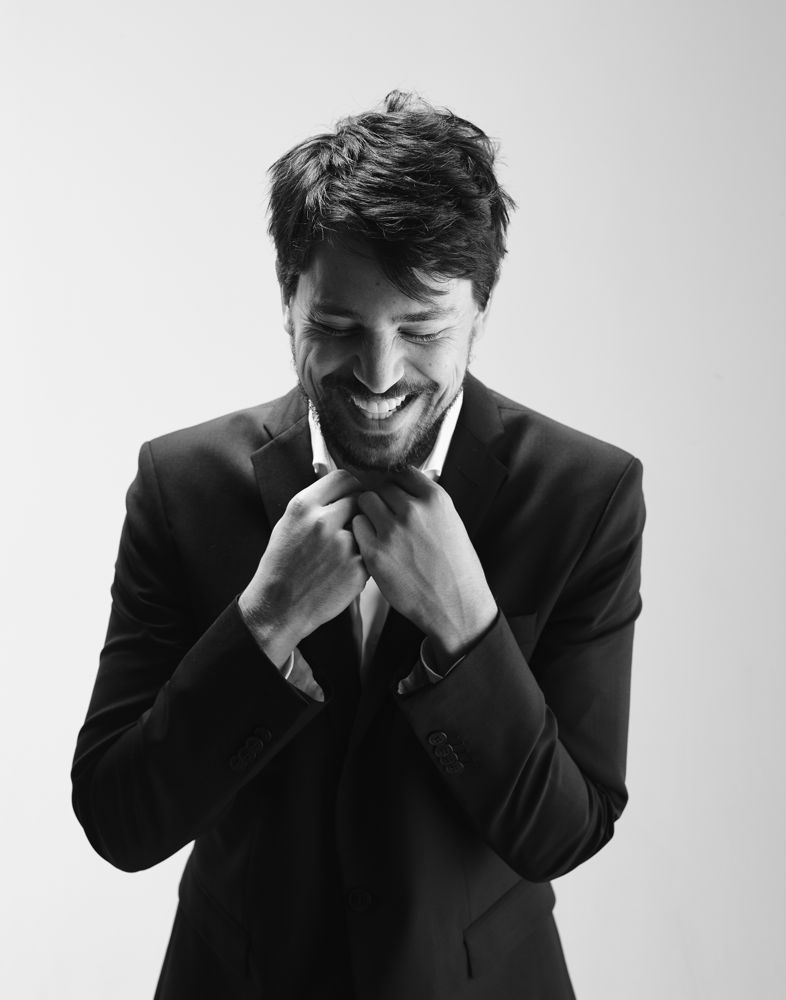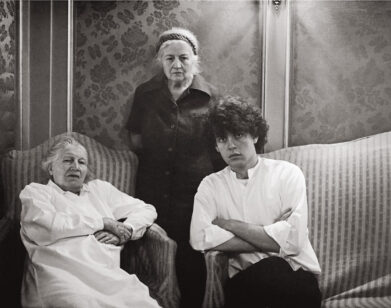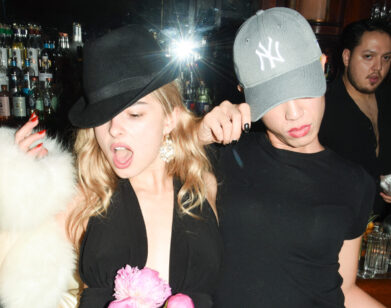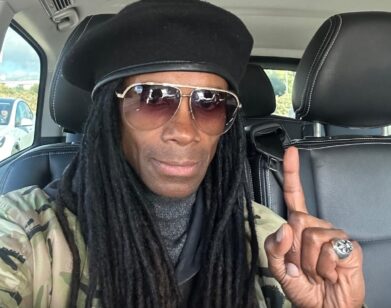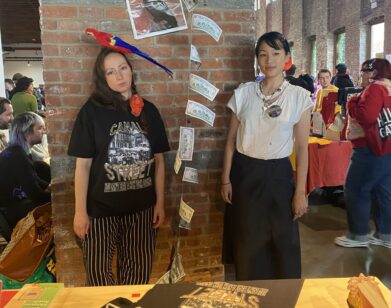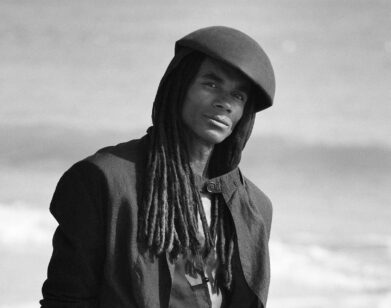Nicholas D’Agosto and the Science of Sex
ALL PHOTOS BY GIULIANO BEKOR.
In this “golden age” of television, a new cable show is an event: recognizable actors, big budgets, and no rules. Showtime’s newest series Masters of Sex is no exception. Starring Michael Sheen and Lizzy Caplan, Masters of Sex tells the true story of St. Louis doctor William Masters and his secretary-turned-partner Virginia Masters as they researched human sexuality in that famously prudish decade, the 1950s. Over their 40-0year career, Masters and Johnson published six books, including Human Sexual Response (1966), Human Sexual Inadequacy (1970), The Pleasure Bond (1974), and the unfortunate Homosexuality in Perspective (1979). As you can imagine, Showtime takes full advantage of this “sex in the name of science” subject matter, with monitored masturbation, and alarming camera dildos.
Completing the cast alongside Sheen and Caplan are Caitlin Fitzgerald (Damsels in Distress) as Master’s wife Libby and 33-year-old Nebraska native Nicholas D’Agosto as his friend and protégé, Ethan Haas. While D’Agosto has been acting consistently since his teenage break in Alexander Payne’s Election, Masters is by far his most promising project. When we called D’Agosto to discuss the show, the actor was appropriately excited.
EMMA BROWN: The first two episodes are sort of a roller coaster for your character. He seems sympathetic at first, then he doesn’t at all, and then he just seems a little young.
NICHOLAS D’AGOSTO: Yeah. That’s an impression, of course, I want you to feel. How much do you hate my character at the end of the first episode? I’m sort of curious.
BROWN: Quite a bit.
D’AGOSTO: [laughs] Good, good.
BROWN: So I’m glad they sent me the second episode, because I was starting to think, “Who is this person?”
D’AGOSTO: Yeah. “I have no desire to interview this person at all, in fact. I find him untrustworthy and violent.” What’s really interesting about my character is that he’s kind of attached to everyone in the show—Libby Masters, Bill Masters, Virginia, the other young people on the staff—and so I get my hands in the mix everywhere. Hopefully people will kind of continue to kind of go back and forth on how they really feel about my character’s personality. Is he just young? Is he actually self-serving? Is he a really genuine guy? And I think that there’s a lot of redemption for my character, which is always fun as an actor, to start off in a dark place and then get to go to a place that’s a bit more likable.
BROWN: His relationship with Libby Masters is quite endearing.
D’AGOSTO: Yeah. I’m sure many of your readers can relate to the idea of the first person that you fall in love with that really kind of blows your mind and then, [when] it ends, it can be a really jarring experience. I think for him, he’s used to getting his way and used to being a pretty dominating figure in his life, especially with the women around him. I think a lot of it is just youth, but he kind of goes through a spiral before he gets back out of it.
BROWN: And was he a real person?
D’AGOSTO: He wasn’t. He’s a fictional amalgamation of a couple of characters, which is one of the reasons I think I’m lucky to get to play him—the writers have a certain kind of freedom with him that they don’t with some of the other characters. But there was a character in Virginia’s life who was an older man—I think he was a judge or a lawyer—after she started working for Masters. The relationship was very advanced and very serious and there was this possibility that she would end up marrying this guy. It would be her third marriage. The indication is that Masters grew very jealous of that man taking Virginia away from him. The other side of it is there was a young doctor in the program at Washington University with Masters and Johnson. He’s referenced a few times as being someone that was close to both of them and worked with both of them, but he didn’t really have any kind of dramatic influence on the narrative. They combined these two characters, this older man who’s the love interest of Virginia and this young doctor at the hospital, and they made me the young doctor love interest.
BROWN: Everyone wins!
D’AGOSTO: [laughs] Exactly.
BROWN: Masters and Johnson’s research was very important in changing how the US viewed sexuality, especially female sexuality. But they also did some not-so-great stuff, like claim they could “cure” homosexuality. Have you talked at all about how the show is going to approach that?
D’AGOSTO: No. They are certainly aware of it, but I would argue that the writers don’t even entirely know yet what they’re going to do. One of the things that’s interesting about this show is, if you were going to try to tell the entire story of Masters and Johnson, it has to take place over, like, three decades. Are they going to age us all over the years? I think there’ll probably be some fudging of the timeline. All of the studies are real, the relationships are real, but obviously liberties are taken with precisely how we’re spinning the story between them. I imagine they’ll treat it very honestly and delicately. I think an audience member at the end of the first season would be hard-pressed to look at Bill Masters and be like, “That’s an amazing guy.” He’s a guy that had some really passionate points of view on a really dynamic subject, but that he was an incredibly complicated and, in his own way, a dominating, dense, somewhat untrustworthy character.
BROWN: Did you read any of the books that Masters and Johnson published?
D’AGOSTO: I didn’t. I read the biography that this whole show is based on and then I read this book by David Halberstam called The Fifties. I was more interested in making sure that we were in the ’50s and that I knew who the presidents were. [laughs]
BROWN: Did you watch movies from the ’50s?
D’AGOSTO: Yeah, I watched movies from the ’50s. I also watched these documentaries on [journalist] Edward R. Murrow. He’s a real treasure trove because he has so much individual footage of interviews with these sort of everyday people from that time period. The acting of the ’50s is really stylized, so you’re not really getting a lot of authentic, everyday characterization of people.
BROWN: How did you get involved in the show in the first place?
D’AGOSTO: It was one of those moments that hasn’t happened very often for me, it’s happened maybe two or three times, where I’ve picked up the script and I not only loved it so dearly, I knew that this character was something I was really looking for and that was really right for me. There’s a lot of times where, as actors, we get parts and we feel like, “Yeah, I could do that,” but this one was just instantly something I loved. The scene that I performed in the audition, one of them was the fight scene and one was the sex scene. I just loved the fact that this guy was just so jealous—how passionate and how hurt he was.
BROWN: And did they just read the other person’s lines to you while you were acting out the sex scene?
D’AGOSTO: [laughs] Yeah. It’s the first time [my character] has ever gone down on a girl, so I had to hold my hands in front of my face, imagining that I was holding something else, and stare up and do the audition. It got killer laughter every time—to see this guy miming holding a woman in front of his face in like a room of 30 execs. [laughs] They’re all sitting there in suits and I’m like, “It’s the most beautiful thing I’ve ever seen.” It was a pretty fun experience, actually.
BROWN: When you were five years old, what did you want to be when you grow up?
D’AGOSTO: Wow. I wanted to be a priest when I was really young. I was raised Catholic, and I think I was really enamored with being up on stage. I think that was my first experience seeing someone that was up in front of an audience and I think I was always from when I was really young, really enamored with it. And then when I was 10, 11, 12 I started getting into improv.
BROWN: Were your parents happy with your five-year-old ambition: “We raised a nice Catholic boy”—or upset by the prospect of no grandchildren?
D’AGOSTO: Well, I have four brothers and sisters, so they were probably not too worried that we were all going to end up priests. I think they found it charming in a little boy—I don’t think it was something that lasted long enough to where they really had to confront it. They were more worried about me going to L.A. and becoming an actor, frankly. [laughs]
BROWN: Obviously you’re a person and not a terrible made-for-TV movie, but the idea of this Catholic boy from Omaha, Nebraska, going to L.A. to become an actor conjures up images of this sweet, innocent person being corrupted by urban living.
D’AGOSTO: Yeah, and the next thing you know he’s doing a bunch of bondage porno scenes. [laughs] Yeah, I did that for like five or six years, and then I finally made my break in Hollywood… No, I was very lucky. When I was 17, I had a small part in the movie Election which shot in Omaha, Nebraska. I was really naïve at the time; I really didn’t know what a big deal it was. Even though it was a small part, it turned out to the thing that kind of gave me access to agents. I moved out after college and I started working right away and I’ve been working ever since.
MASTERS OF SEX PREMIERES ON SHOWTIME THIS SUNDAY, SEPTEMBER 29.

